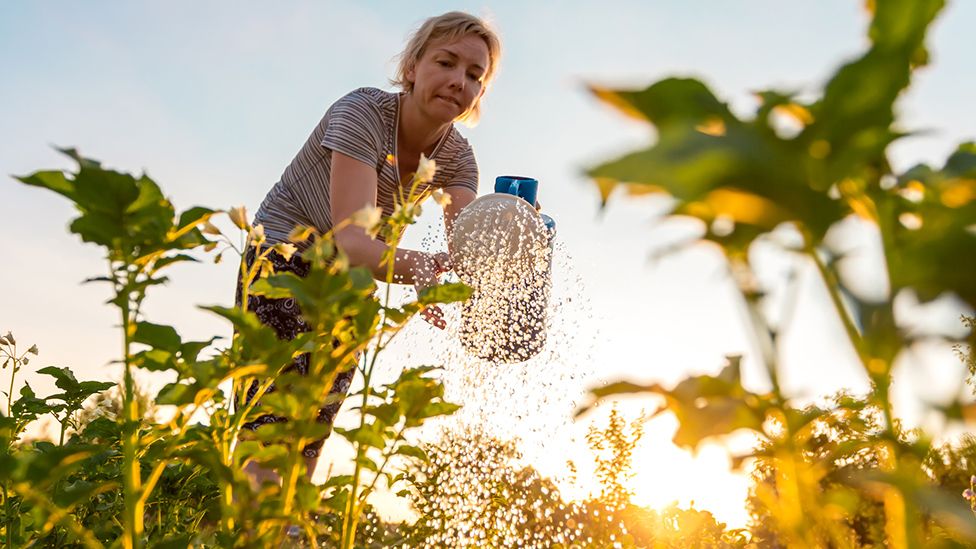Where are hosepipe bans in place and how can I save water?
- Published

Water companies have announced hosepipe bans in some areas after temperatures climbed to 30C this week.
People in affected areas cannot use hosepipes to water gardens, clean their cars or fill paddling pools.
Which areas have bans in place?
South East Water has introduced a hosepipe and sprinkler ban in Kent and Sussex, external.
The water company imposed the ban after supply issues left around 4,000 customers without water. Others were experiencing low water pressure, in areas including Wadhurst, Mayfield, Biddenden and Staplehurst.
It is understood the ban can only be enforced after 10 days of consultation. That means rule-breakers could face a £1,000 fine from 26 June.
There is also a ban across Cornwall and in parts of Devon, including the Colliford and Roadford areas, according to South West Water's website. , external
Elsewhere, water companies are monitoring water levels closely, although no hosepipe bans are currently planned in other parts of England. There are no bans in place in Scotland, Wales and Northern Ireland.
The Environment Agency said bans have been put in place because hot weather affects how quickly water storage reservoirs can be refilled. It said there is no threat of a drought in the UK at present.
What is a hosepipe ban?
Both South East Water, external and South West Water, external have said people living in certain areas are not allowed to use a hosepipe to:
water the garden
water plants
wash the car, patio or a boat
fill a swimming or paddling pool
fill or maintain a domestic pond
Anyone breaking the rules could face a fine of up to £1,000.
But there are some exceptions:
for business use (for example, watering commercial crops or running a car wash business)
to fill pools needed for medical treatment
to water a new lawn within 28 days of it being laid
to fill a fountain used for religious practices
to top up a fishpond when the welfare of the fish depends on it
How can I water the garden if I can't use a hosepipe?
Gardener Leigh Johnstone from Southampton, who shares tips on TikTok, says plants are hardier than most people think.
Mr Johnstone suggests using a water butt to collect any rain water, as well as using "grey water" from baths and cooking pots.
However, he cautions soapy water should not be used on edible crops.
Plants can also be "mulched" to stop moisture escaping, by adding material such as wood chippings to the top of the soil.
Leigh Johnstone, known as the Beardy Gardener on TikTok, says there are lots of ways to save water
He also suggests planting drought-resistant plants such as lavender, Euphorbia and wildflowers.
The Royal Horticultural Society (RHS) recommends using watering cans rather than hosepipes because they direct water more accurately to the roots of plants.
Watering in the morning or evening can also help reduce evaporation.
In addition, the RHS suggests allowing the grass on lawns to grow taller, so that it develops deeper roots which can draw water from further underground.
It also recommends installing water troughs, putting saucers under plant pots to reduce waste, and using homemade compost.
Do hosepipe bans work?
Water UK, which represents the UK's water industry, says hosepipe bans normally reduce water usage by about 10%.
It suggests further water-saving measures, such as reusing paddling pool water, washing dogs outside instead of in the bath and filling ponds with rainwater.
However, each day, three billion litres of water is lost through leakage, according to a National Audit Office (NAO) report.
In 2018, daily demand for water in England and Wales was 14 billion litres.
The Environment Agency has said "government expects water companies to act to reduce leakage and fix leaking pipes as quickly as possible".
How will you be affected by the issues in this story? Share your experiences haveyoursay@bbc.co.uk, external.
Please include a contact number if you are willing to speak to a BBC journalist. You can also get in touch in the following ways:
WhatsApp: +44 7756 165803
Tweet: @BBC_HaveYourSay, external
Please read our terms & conditions and privacy policy
If you are reading this page and can't see the form you will need to visit the mobile version of the BBC website to submit your question or comment or you can email us at HaveYourSay@bbc.co.uk, external. Please include your name, age and location with any submission.
Related Topics
- Published19 June 2023
- Published13 June 2023
- Published15 August 2022